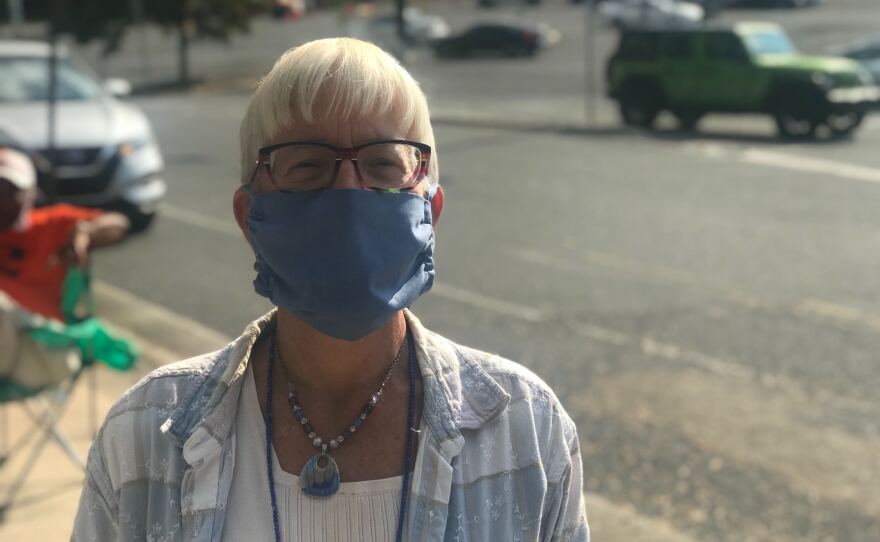Long lines formed at polling places across North Carolina on Thursday as the battleground state kicked off early in-person voting.
Early voting locations that opened in all 100 counties attracted crowds in the high-stakes swing state. More than 500,000 people have already cast mail-in absentee ballots amid the COVID-19 pandemic.
And by 5:30 p.m. Thursday, the State Board of Elections said 230,000 ballots had been cast in North Carolina on the first day of in-person voting — up from 166,000 on the first day of early voting in 2016.
So far, about 11% of the state's registered voters have already cast ballots for the Nov. 3 election.
An influx of early in-person voters and social distancing rules for early voting — people having to stand six feet apart — resulted in long lines at many polling sites. All 100 counties had sites open Thursday. In Charlotte, large venues like Bank of America Stadium, the Spectrum Center and Bojangles Coliseum are being used for early voting sites.
Covering #EarlyVoting at the Bojangles’ Coliseum. A long line, but pretty calm and social distanced.
— Alexandra Watts (@alexandrawatts_) October 15, 2020
Also because of COVID-19, no stickers will be handed out. pic.twitter.com/MbAU3XX3hK
The early-vote option, which continues until Oct. 31, allows someone to vote at any voting center in their county of residence. People can also register to vote and cast a ballot at the same time during the early-vote period.

Anthony and Diane Rose got to the Cabarrus Arena and Events Center just after 8 a.m. and had to wait about two hours to cast their ballots.
"It's the first day, so I thought it would it would be a pretty good line," Anthony Rose said after they voted. "It's about what I expected."
Anthony Rose hadn't voted early in previous elections, but Diane Rose had. She said it took her about 45 minutes last time.
Anthony Rose said myriad issues drove him to the polls: "COVID-19, civil unrest, the economy, police brutality and integrity."
Thursday was also Richard Mills' first time voting early. He waited about an hour at Bojangles Coliseum in east Charlotte.
"I wanted to make sure my vote counted more this year than in the past," Mills said.
Mills said health care was his chief concern.
At the University Area site off JW Clay Boulevard, Keya Baker arrived just as the polls opened at 8 a.m. and waited four hours to cast her ballot. She said there were maybe 10-12 voting stations inside the building, but the lines remained long.
"I feel like our voices are not being heard," Baker said. "I feel so bad that I voted before for the last (2016) election, but I didn't go back two years later. So now I'm telling my children to make sure that we don't just follow up with the presidential vote, but the Congress and Senate vote."

By about 3 p.m., however, lines at some polling places had dwindled down. At Spectrum Center, which is a voting site for the first time, corrals set up for lines were empty.
Bojangles Coliseum was another large early voting site in Mecklenburg County. Site coordinator Mary Blinn said lines were "significant" in the morning, but by about 3:30 p.m., they were manageable. She said 25 voting machines helped move people quickly through the line, and she expects another surge in the evening when people get off work.
And as North Carolina gets deeper into its early voting periods, she expects the crowds of voters to get bigger.

"I do think as we get closer to the end of early voting, our numbers will go up and up," Blinn said.
More than 60% of the total ballots cast during the 2016 presidential election in North Carolina were cast through early in-person voting, or nearly 3 million votes. That percentage is likely to drop in 2020 as more 500,000 absentee ballots have been turned in so far — 10 times more than had been cast by mail at this point in the 2016 election.
Mail-in ballots have been preferred by those at higher-risk for severe illness from the coronavirus and those who want to avoid long lines. These absentee ballots also can be dropped off at early-vote sites.
State and county election officials have been preparing for months for in-person voting, accumulating personal protective equipment for poll workers and voters. Voters are encouraged but not required to wear masks. In many locations, the “I Voted" stickers usually handed out will be replaced with single-use pens that voters can take home once they fill out their ballot.
It's the first day of early voting in @MeckCounty and lines are firming even before the polls open. The line stretched around #CorneliusNC town hall at 7:50am. More on the election and candidates at @WFAE https://t.co/MdF9SE5nAB pic.twitter.com/3G8uIYn74l
— David Boraks (@davidboraks) October 15, 2020
Exemplifying the critical importance of this wave of voting, President Donald Trump planned to hold a rally Thursday afternoon in Greenville, while Democratic vice presidential nominee Kamala Harris had prepared for appearances in Charlotte and Asheville before canceling her trips after two people connected to the campaign tested positive for the coronavirus.
In addition to the presidential race, voters are choosing between Republican Sen. Thom Tillis and Democratic challenger Cal Cunningham and between Democratic Gov. Roy Cooper and Republican rival Dan Forest, the current lieutenant governor. All 13 U.S. House and 170 General Assembly seats are up for reelection, as are several other statewide elected positions on the Council of State and the appellate courts.
Tell us about your voting experience. Did it go smoothly? Were there any problems? How were the lines? Did you feel safe? If so, why or why not?
_





















